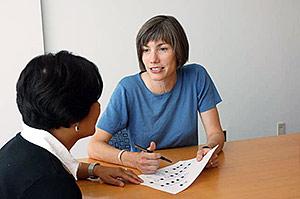New report urges doctors to test and alert patients to genetic conditions
Genetic counselor going through test results with a patient. (Photo by United States National Institutes for Health via Wikimedia Commons).
New guidelines were released last week from the American College of Medical Genetics and Genomics urging doctors who sequence a patient’s full set of genes to test for 24 genetic conditions.
The ACMG, a national organization of genetic specialists, is also requesting that doctors alert patients of diseases written into their DNA, regardless if the patient wants to know the results or not.
Inga Barnello submit to a genetic test for breast cancer 12 years ago at the request of her sister, who was dying of the disease.
“The test I was going for — the breast cancer gene — was intimidating enough. I’m afraid women won’t do it at all if they’re going to find out all this other stuff,” Barnello says. “I want people to do this testing. I don’t want them to be overwhelmed.”
Arthur Caplan, head of the Division of Medical Ethics at the New York University Langone Medical Center, a patient should be asked if they want to know the results of tests, especially if these results are not the reason for the visit.
Genome tests can find everything from paternity to diseases and disorders for which doctors are unable to do take any action. Caplan says doctors should ask patients whether they would like the results of genome tests in part because these tests can be difficult for doctors to understand and because they are unable to tell a patient when a condition will appear in their lifetime.
“The principle that we ought to follow is before any test result gets presented, ask the patient if they want to hear it or know it,” he says.
Some people might know that they are predisposed to have a disease but will choose not to get tested, Caplan says.
“I like the guidelines…but we’ve got to train doctors to do the counseling and to understand the information before they start telling people the results. If you don’t have competent counseling, you’re going to create a lot of anxiety, perhaps a lot of unnecessary worry. But you’re not going to lead people to do the right thing with the information they’re getting,” he says.
Barnello had a genetic counselor with her when she received her test results because it was difficult to process what the results meant. But doctors do not receive training in medical school to offer this kind of counseling, Caplan says.
“There aren’t enough genetic counselors around to do this and there probably won’t be for the foreseeable future. So, we’ve got to train people to present the information,” he says.
